“Ponder well on this point: the pleasant hours of our life are all connected by a more or less tangible link, with some memory of the table.” – Charles Pierre Monselet
Nearly four years ago, I was living in Besançon, France, teaching English to elementary French students. My roommates and I came from different countries – the U.S., Austria, and England. As a way to learn more about each other, and our countries, we would occasionally have roommate dinners, where one of us would cook a national dish for the others. We loved these dinners so much that we decided to host a soirée internationale, or an international dinner, where we invited our friends to bring dishes that represented their cultures and countries. For that dinner, I decided to make biryani. Although it’s not a traditional food in the U.S. or for Chaldeans, I wanted to make something full of spices and flavor. And so I settled on biryani. Although I have eaten biryani since my séjour in France, I haven’t cooked it since then. (If you’re interested in seeing some pictures for my international dinner in France, you can find them here).
Biryani is not a traditional Chaldean dish; it hails from India. But Chaldeans have the adopted the dish and made it their own. There are multiple variations of biryani depending on the country of origin or the person who’s making it. Some versions have chopped vegetables, nuts, dried fruits, long grain rice, short grain rice…and the list of possible variations goes on.This version of biryani is my personal favorite, since it’s the way that my mom always made it growing up. Biryani is not something that we make often, since it’s rather time consuming. It’s also a hearty and heavy dish, which makes it more comforting on a cold winter day.
What’s the key to making an excellent biryani? Onions. Slowly cooked and simmered in spices, the onions become a flavorful paste that coat the chicken, potatoes, meatballs and rice in spicy deliciousness.
Depending on how much you like to eat, this recipe serves about 6 people.
Ingredients
5 russet potatoes, cubed
Boiled Eggs (optional)
Onions
- 4 medium yellow onions
- 1 teaspoon salt
- 1 tablespoon biryani
- 2 tablespoons curry
- 1 teaspoon dried lime (noomi-basra)
- ¼ cup vinegar
- ¼ cup water
Rice
- 3 cups rice
- 3 ½ cups water or chicken stock
- 2 bouillon cubes
- 2 tablespoons biryani
Meatballs
- 1 tablespoon baharat
- 1 pound ground chuck
- ½ teaspoon salt
Directions
Meatballs
- Add 1 tbsp baharat and a ½ tsp salt to 1 lb ground chuck
- Gently mix the meat and spices together (the more you mush the meat, the tougher it becomes!)
- Roll the meat into small, roughly ½ inch meatballs. You should have about 25 meatballs.
- Add the meatballs to a large frying pan. Cook on medium to high heat. (If you’re using a small frying pan, you may need to cook the meatballs in batches. If you’re using a large frying pan, you can cook all the meatballs at once.
Potatoes
- Wash, peel, and cube the potatoes
- Fill a medium-sized pot with oil, about 1-inch deep. Heat the oil on medium-high heat. Fry the potatoes in batches, until golden brown.
- Place fried potatoes on paper towel to absorb excess oil.
Onions (the most important part!)
- Slice 4 to 5 medium yellow onions very thin
- Add a few tablespoons of oil to a frying pan. Heat the oil for a few minutes and then add the onions. Sprinkle with 1tsp salt. Cook the onions on medium heat until they become translucent
- Once the onions are translucent, add 2 tbsp of curry and 1 tsp dried lime. Cook the onions and spices for about 5 minutes.
- Take the onions off the heat.
- Add ¼ cup vinegar, ¼ cup water and stir. Set the onions aside.
Rotisserie Chicken
- Pull apart the chicken, and shred the light and dark meat. Make sure to remove all the small bones!
Rice
- Wash 3 cups of basmati rice until the water runs clear.
- In a large pot, heat a few tablespoons of oil. Add the rice and stir.
- Let the rice sit for a few minutes. Add the stock. Add 2 tbsp biryani spice.
- Cook the rice on low-medium heat until all of the stock evaporates. Turn the heat off, and let the rice sit for a few minutes.
Assembly
- In a large bowl or pot, mix together the cooked meatballs, potatoes, onions, chicken, and rice. If you prefer your biryani to have more khulta (the add-ins, not including the rice), you may want to add less rice.
- Pile the biryani on a plate, and dig in!







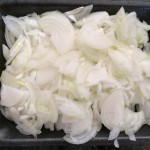

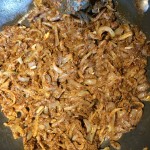
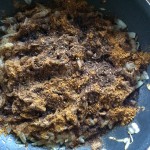

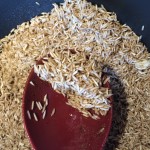
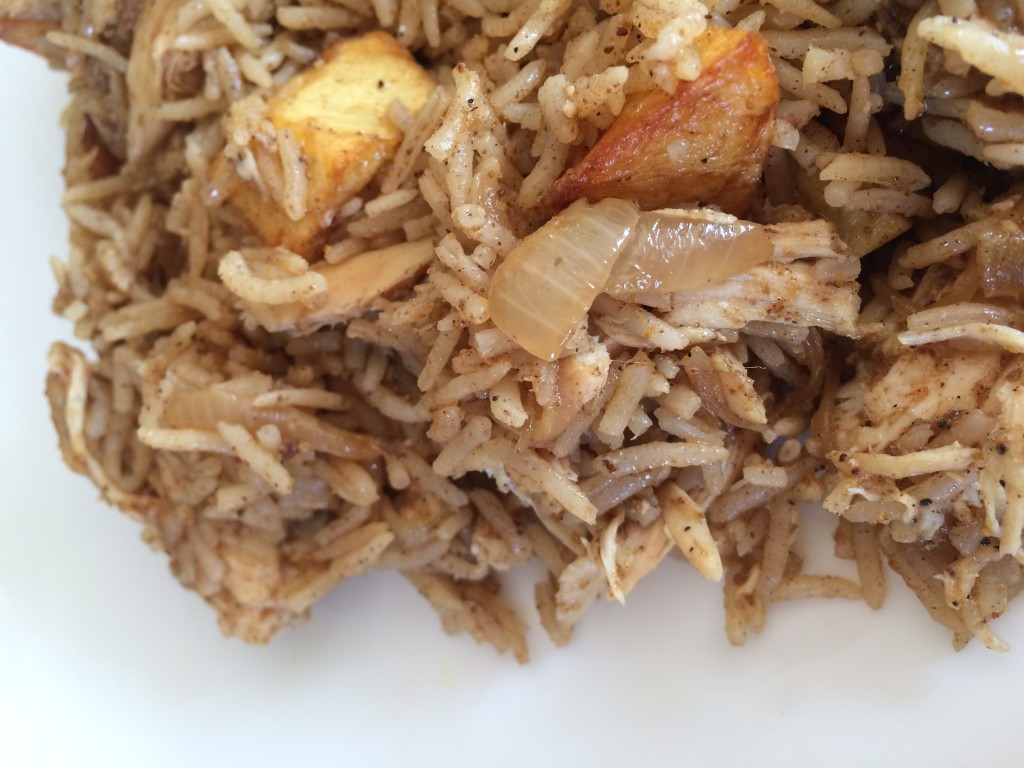
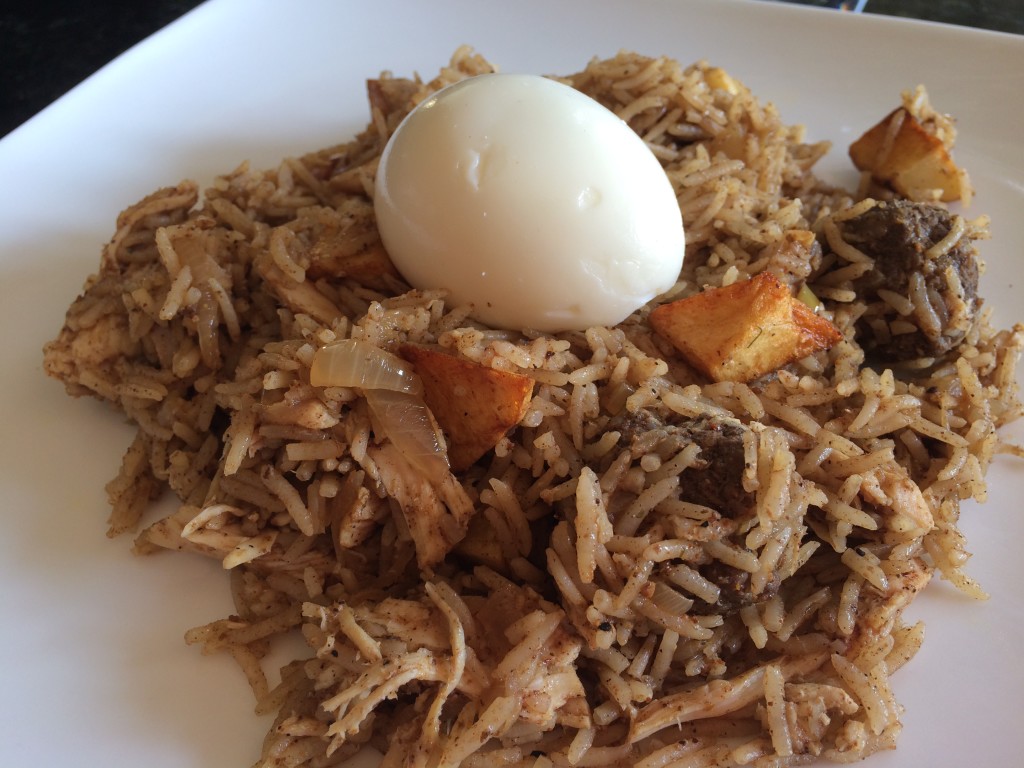
Hello,
Thanks for sharing such a great recipe and information. I was baffled to read Biryani is not a Chaldean dish. I knew it also existed in Indian cuisine, but the Chaldeans I have met in the United States, consider it very much a Chaldean food. Can you explain more about it’s origin?
Hi Reme,
So, I actually need to correct my post. Biryani is Persian in origin. The word “biryani” is derived from a Persian word, possibly rice or fry, or even fried rice. I’m not sure when or how the dish traveled to India and the Middle East, but parts of India and the Middle East have their own unique version of the dish. BBC has an interesting article that goes into more details about the origins of biryani, which you can read here.